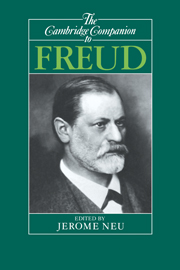Book contents
- Frontmatter
- Introduction
- 1 Freud: The psychoarcheology of civilizations
- 2 Seduced and abandoned: The rise and fall of Freud's seduction theory
- 3 Freud's androids
- 4 The interpretation of dreams
- 5 The unconscious
- 6 The development and vicissitudes of Freud's ideas on the Oedipus complex
- 7 Freud and perversion
- 8 Morality and the internalized other
- 9 Freud on women
- 10 Freud and the understanding of art
- 11 Freud's anthropology A reading of the “cultural books”
- 12 Freud's later theory of civilization
- 13 In fairness to Freud: A critical notice of The Foundations of Psychoanalysis, by Adolf Grünbaum
- Bibliography
- Cited works of Freud
- Index
- Series list
3 - Freud's androids
Published online by Cambridge University Press: 28 May 2006
- Frontmatter
- Introduction
- 1 Freud: The psychoarcheology of civilizations
- 2 Seduced and abandoned: The rise and fall of Freud's seduction theory
- 3 Freud's androids
- 4 The interpretation of dreams
- 5 The unconscious
- 6 The development and vicissitudes of Freud's ideas on the Oedipus complex
- 7 Freud and perversion
- 8 Morality and the internalized other
- 9 Freud on women
- 10 Freud and the understanding of art
- 11 Freud's anthropology A reading of the “cultural books”
- 12 Freud's later theory of civilization
- 13 In fairness to Freud: A critical notice of The Foundations of Psychoanalysis, by Adolf Grünbaum
- Bibliography
- Cited works of Freud
- Index
- Series list
Summary
A recent essay in Science compares Freud's work with contemporary “cognitive science.” The comparison is rather to Freud's disadvantage, and to the disadvantage of Freud's contemporaries: Our contemporaries have a conception of the mind as a computational system. Some of their theories posit a quantity, “activation,” that is responsible for aspects of mental functioning. Some of their theories postulate “parallel processing” through a network that is analogous to the connected system of nerve cells in the human nervous system. Unlike Freud, the story goes, our contemporaries have an experimental tradition that supports their theories. The result is that we now have a powerful and distinctive science of both the unconscious and the conscious, a science whose theories have led to new experiments “that tentatively reveal a tripartite classification of nonconscious mental life that is quite different from the seething unconscious of Freud.”
In a general way, these perceptions are widely shared, not only among academic psychologists, but among philosophers of mind, philosophers of science, research administrators, and increasingly, the educated public. They have the impression that contemporary cognitive psychology with its computer simulations of mind is onto something new and scientific that was at best only dimly foreshadowed in earlier psychologies. My purpose is to argue the contrary. A big part of contemporary cognitive science is pretty much what you would expect to get if Sigmund Freud had had a computer.
- Type
- Chapter
- Information
- The Cambridge Companion to Freud , pp. 44 - 85Publisher: Cambridge University PressPrint publication year: 1991
- 11
- Cited by



